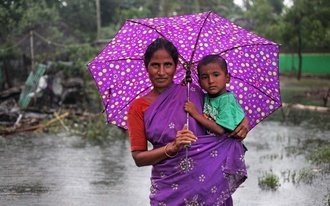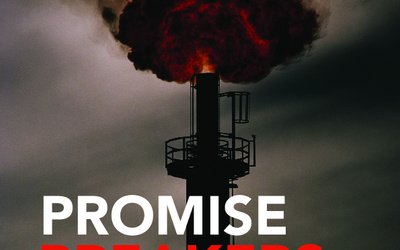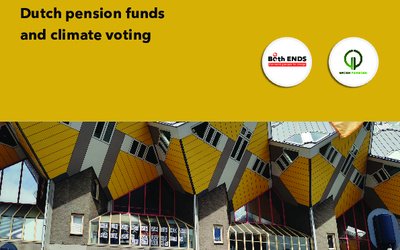The Climate lawsuit against Shell
Both ENDS is co-plaintiff in the climate lawsuit being brought by Milieudefensie (Friends of the Earth The Netherlands) against Shell to stop the company from causing harm to the climate. Shell has known about the severity of the climate problem for many years but continues with the climate-polluting extraction of oil and gas. By doing so, it undermines efforts to achieve the climate goals. Companies have a responsibility not to cause serious harm to society and the climate. Because Shell refuses to take that responsibility itself, we are taking the company to court. In brief, we demand that Shell has zero greenhouse gas emissions by 2050 and adapts its activities to be fully aligned with the climate goals in the Paris Agreement.
Logical step for Both ENDS
It is a logical step for Both ENDS to be co-plaintiff as we have been working together with local environmental and other organisations in developing countries for many decades to combat the consequences of the activities of Shell and other fossil industry businesses for people around the world. We are not demanding compensation, but that Shell changes its course to help prevent climate change. We also hope that this case will lead to changes not only at Shell but also at other oil and gas companies that stand in the way of the energy transition.
Both ENDS’ added value over most of the other co-plaintiffs lies mainly in the link between global climate change, its impact on nature and the environment worldwide and its unprecedented impact on poor people in poor countries. We connect climate change to the Netherlands’ goals for combatting poverty around the world, such as the Sustainable Development Goals.
Pollution, destruction and climate change
A company such as Shell harms people in the countries where it is active in two ways. Firstly the consequences of climate change, to which the use of Shell’s products makes a significant contribution, disproportionately affect people in developing countries. Secondly the extraction of fossil fuels destroys ecosystems on a large scale, which not only causes more climate change but also seriously erodes the livelihoods of local populations: water sources become polluted and agriculture or fishing encounter severe obstacles. Our decision to become co-plaintiffs in this case is therefore based on our duty towards all people who suffer the impact of climate change on a daily basis.
Investing in fossil fuels is short-term thinking
Climate change and climate policy have always been and continue to be a major theme in our work, primarily because we focus mainly on the poorest and most vulnerable groups in countries in the global South. They suffer most from the consequences of climate change, while they have contributed to it the least. It has been agreed worldwide that emissions of CO2 must be reduced radically to restrict global warming to 1.5 degrees. The main condition for achieving that is to prevent new emissions from greenhouse gasses by keeping fossil reserves ’under the ground’. To stay on track with the Paris Agreement, it is therefore very irresponsible to continue extracting and exploiting new oil and gas fields and building the required infrastructure, as Shell continues to do. And yet Shell persuades the governments of countries with fossil reserves to invest in this sector. As these investments cannot be recovered if we want to take climate goals seriously, investing in sustainable energy should get the highest priority.
Invest in renewable instead of fossil energy
In Tanzania, an extremely poor country, Shell is involved in developing one of the largest gas fields in the world for the international market. The poorest groups are affected the most by these projects; their local environment is being destroyed and the land and water polluted, they are often forced to relocate and do not share in the gas profits with which Shell tempts their governments. By continuing to invest in the fossil sector rather than in sustainable energy, these countries risk becoming highly dependent on export to foreign countries and lagging behind in their own development.
Legal action
In the 30 years during which, together with partner organisations around the whole world, we have fought for climate action, we have seen that nothing has changed in the daily practice of the fossil industry. Even worse, the sector has done everything possible to prevent positive changes. There are very few restrictions on the fossil fuel sector searching for new oil and gas fields and it can make use of a wide variety of financial and other government support without having to account for its role in global warming. In the meantime increasingly large groups of people are suffering the consequences of rising global temperatures so much that they can hardly lead their lives. In our opinion, therefore, taking legal action is necessary to compel companies such as Shell to take real action and we are pleased to be co-plaintiff in this case.
Read more about this subject
-
Dossier
Uganda’s Energy Future
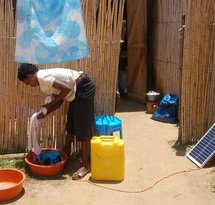
Despite the existence of many hydropower dams, foreign investments and large government spending on energy, and new plans for hydropower, oil and gas projects, the vast majority of rural Uganda still remains without electricity. Together with our local partners we are striving towards a sustainable energy strategy for Uganda that starts from the needs and wishes of local communities.
-
Dossier
Gas in Mozambique
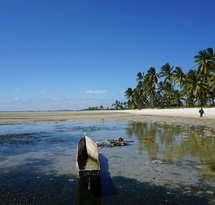
In 2011 one of the world’s largest gas reserves was found in the coastal province of Cabo Delgado, in the north of Mozambique. A total of 35 billion dollars has been invested to extract the gas. Dozens of multinationals and financiers are involved in these rapid developments. It is very difficult for the people living in Cabo Delgado to exert influence on the plans and activities, while they experience the negative consequences. With the arrival of these companies, they are losing their land.
-
Dossier
Making pension funds more sustainable
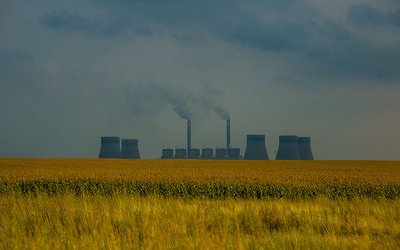
Pension funds have a lot of influence because of their enormous assets. Both ENDS therefore wants pension funds such as the Dutch ABP to withdraw their investments from the fossil industry and to invest sustainably instead.
-
Dossier
The Netherlands and the SDGs: A better world starts with yourself

In 2015, the member states of the United Nations committed themselves to the ambitious Sustainable Development Goals (SDGs). Unlike their predecessors, the Millennium Development Goals (MDGs), the SDGs recognise the importance of equality within and between countries, of decision-making processes in which all people are included and heard, and of legal systems that are independent and accessible to all.
-
Dossier
Paris Proof Export Support

Almost two-thirds of the export credit insurances that Atradius DSB provided in the 2012-2018 period went to the fossil energy sector. That is contrary to the climate agreements that the Netherlands signed in Paris.
-
News / 2 April 2024
The Climate lawsuit against Shell
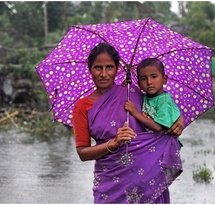
Milieudefensie (Friends of the Earth Netherlands) and 6 other organisations are confidently heading into Shell’s appeal of the 2021 climate ruling, which will take place on April 2nd in The Hague. In the landmark lawsuit against the oil and gas company, the court decided that Shell must slash its CO2 emissions by 45%, in line with international climate agreements.
-
News / 21 December 2023
The Netherlands is certainly not more Catholic than the Pope
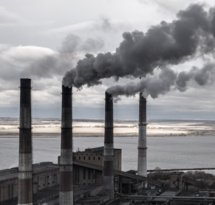
The Netherlands is well on its way with the energy transition at home, but our country continues to encourage Dutch investments in fossil projects elsewhere. This is obviously not in line with the climate goals and, moreover, these kinds of projects cause major problems in the countries where they take place. What can a new cabinet do to reduce the Dutch footprint abroad? Ellen Mangnus discussed this with several experts: today part 2.
-
News / 18 December 2023
Recommendations for Dutch foreign policy that works for people and planet, everywhere
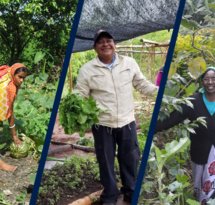
The parliamentary elections in the Netherlands are over, and the dust has somewhat settled. No matter what government emerges from the process, one thing is clear: in the Netherlands the main focus is on the Netherlands. Foreign affairs were hardly mentioned during the elections and the same applies to the process of forming a new coalition. More alarmingly, some of the winners in the elections want to cut themselves off even further from the world around us. -
News / 14 December 2023
The Netherlands can radically reduce its agrarian footprint

In the weeks following the elections, Both ENDS is looking at how Dutch foreign policy can be influenced in the coming years to reduce our footprint abroad and to work in the interests of people and planet. We will be doing that in four double interviews, each with an in-house expert and someone from outside the organisation.
-
Letter / 4 May 2023
Letter from NGOs to Dutch export credit agency: CSR policy must be strengthened
The Dutch government, through its export credit agency Atradius DSB (ADSB), provides export support to companies that undertake activities abroad. The state wants projects it insures to have no negative consequences for people and the environment and therefore sets requirements for corporate social responsibility (CSR). A consultation on CSR policy ran until the end of April, to which a coalition of thirteen social organisations from the Netherlands and abroad, including Both ENDS and Milieudefensie (Friends of the Earth the Netherlands), responded.
-
Publication / 15 March 2023
-
Press release / 9 March 2023
Dutch Pension funds do not vote in line with climate ambitions
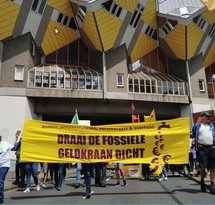
Authors note rectification 13 April 2023
Most Dutch pension funds and their asset managers do not vote consistently in favour of climate resolutions at the oil and gas companies and banks in which they invest. That is the conclusion of a report published today by Both ENDS and Groen Pensioen. Eleven of the twelve* Dutch pension funds studied have made public statements and pledges about adapting their policies in line with the Paris Climate Agreement. But their voting behaviour does not sufficiently correspond with these pledges. Only pension fund PME votes for 100% in line with its own climate promises.
-
Publication / 9 March 2023
-
Letter / 28 February 2023
175 CSOs call on world leaders to end OECD export finance for oil and gas
This joint position launched by 175 civil society organisations from 45 countries calls on world leaders to end OECD export finance for oil and gas, and explains how it can be done.
-
News / 20 February 2023
Almost 60 organisations send a letter about fossil export support to Dutch Parliament

Today, a letter, undersigned by almost 60 organisations from countries that face the consequences of fossil fuel projects or stand in solidarity, has been sent to the Dutch Members of Parliament. This Thursday, a debate about the export credit facility and the policies around it, will take place in the Dutch Parliament. The coalition calls upon Dutch politicians and policy makers to stand up against any form of export support for fossil fuel projects that are to be executed by Dutch companies abroad, expecially in the global South.
-
Letter / 20 February 2023
Letter of international CSO's to Dutch Parliament: close gaps in Dutch policy on limiting public finance to fossil fuels
In October 2022, the Dutch government published a policy to implement the COP26 statement in which it promised to stop public finance for fossil fuel projects abroad by the end of 2022 . The proposed policy, unfortunately, has quite some 'loopholes' that make it possible for the Dutch government to keep supporting large fossil projects abroad for at least another year. These projects often run for years and will have a negative impact on the countries where they take place for decades to come.
-
Letter / 15 December 2022
No export credit support for Santos FPSO
In October this year, the Dutch government published a policy to implement the COP26 statement in which it promised to stop public finance for fossil fuel projects abroad by the end of 2022 . In spite of this pledge, the Netherlands is considering granting an export credit insurance to a floating production storage and offloading (FPSO) vessel that will be used to produce oil and fossil gas in Brazil for a period of 30 years.
-
Press release / 3 November 2022
The Netherlands breaks major climate promise to end public financing for international fossil fuel projects

Today, a week before the international climate summit in Egypt, the Dutch Government has broken a major climate promise it made last year to end public financing for international fossil fuel projects. International and Dutch NGOs argue that the new policy published by the Dutch Government on restricting finance for fossil fuels has such significant loopholes, that it essentially means The Netherlands has reneged on its promise.
-
News / 24 October 2022
Termination of Energy Charter Treaty by the Netherlands helps global energy transition
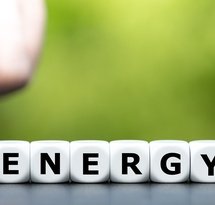
The decision of Minister for Climate and Energy Rob Jetten to withdraw from the Energy Charter Treaty (ECT) is good news for the energy transition in the Netherlands and beyond. Governments of countries that are party to this treaty can therefore shape the transition to sustainable energy without having to fear claims by Dutch-based businesses.
-
Letter / 30 September 2022
CSO letter to the Netherlands on urgently implementing COP26 Commitment
Last year at COP26, the Netherlands, alongside 38 other governments and institutions, committed to the Glasgow Statement on International Public Support for the Clean Energy Transition. By signing this statement, the Netherlands has committed to ending new direct public support for the international unabated fossil fuel energy sector by the end of 2022- a commitment it has yet to deliver.
With this letter, 20 civil society organisations call on the Netherlands to announce its implementation policies for the Glasgow Statement ahead of the Export Finance for Future (E3F) Summit on the 3 November. The E3F Summit is a critical opportunity for the Netherlands to uphold the commitments made in Glasgow last year, alongside all other E3F members.
The recent E3F transparency report highlighted that Netherlands insured 6x more fossil fuel transactions than renewables from 2015-2020, with 3 billion EUR in fossil fuel transactions compared to only 0.5 billion EUR in renewables. This demonstrates that a fossil-fuel exclusion policy for Dutch export support is urgent, and essential, to align the Netherlands with its Glasgow commitment and the Paris Agreement.



